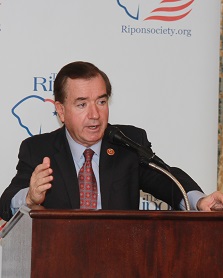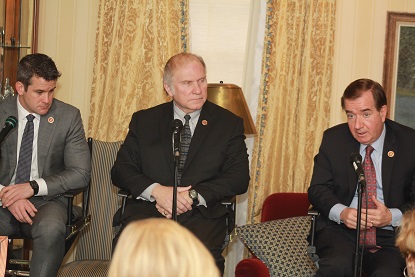Royce, Chabot and Kinzinger discuss drift in foreign policy under the Obama Administration and the instability that has ensued as a result

WASHINGTON, D.C. – The Chairman and two members of the House Foreign Affairs Committee appeared before a breakfast meeting of The Ripon Society yesterday morning to discuss the drift in U.S. foreign policy under the Obama Administration and the chaos that is breaking out around the world as a result.
“Let’s talk about Ukraine,” stated Committee Chairman Ed Royce. “How advantageous would it be if — instead of flaring our natural gas here in the United States and capping wells — we instead shipped it to Eastern Europe, where countries like Lithuania are 100 percent dependent on Russia and therefore pay the highest price in the world for gas. This would be an enormous advantage for us. It would help us in our deficit. And it would certainly confound the problem for Russia with respect to their significant deficits as a share of GDP.
“As it stands now, Russia is in a position of having 70 percent of its exports in oil and gas. Fifty-two percent of the support for the military and government in Russia comes from this amazing monopoly that they hold over Eastern Europe. Rather than break that monopoly, the Administration chose instead to ask Leader Reid to drop any strategy that would allow us to take our excess gas and put it into the Ukraine. Even Poland, even Hungary, as dependent as they are on Russia, last year in the moment of the crisis shipped two billion cubic yards of gas to Ukraine in order to try and stave off the problem. They could see that President Putin had Ukraine by the throat.
“Had we stepped in — had we announced some massive strategy or some major U.S. effort where we were going to get gas into Ukraine — it may have done something to cause second thoughts in Moscow. But we’re not sending the type of message that Russia would consider serious. We’re not saying we will go and compete with you to our benefit and negatively impact your economy should you use your monopoly power this way. No, we’re sending a very different message.”
Royce, who represents the 39th District of California, is serving his 11th term in Congress and is in his second year as Chairman of the Foreign Affairs Committee. A longtime active member of the panel, he is known for his knowledge of many different regions of the world and analytical foresight into key U.S. foreign policy issues. He is also known for his familiarity with numerous world leaders – including the current President of Russia.
“I remember my first meeting with Putin,” he recalled. “Another Member of Congress and I were asked to meet with two members of the city council from St. Petersburg. This was right after the collapse, and one of them was Putin. He was Vice Mayor. I didn’t know much about him. And we brought along one other person that we knew, Jack Wheeler, who had done some work in Russia and therefore knew a little bit of Russian. We were at Irish Times having a few beers and Vladimir Putin, the Vice Mayor of St. Petersburg, and Jack were in the middle of this arm-wrestling competition. And all of a sudden Putin jumps up, and Jack jumps up, and Putin points at Jack’s chest and yells, ‘CIA!’ And Jack points back, ‘KGB!’ That’s the first time I realized this is about more than just attitude. In talking with those other two representatives of St. Petersburg afterwards, it was clear to me that the hostility felt towards the breakup of the former Soviet States was considerable.
“This was an individual who took great pride in his work. I was in East Germany back when I was in the state senate on an exchange program in the early ‘80s. I still remember the way that society worked. Our broadcasts into East Germany under Reagan were just beginning to hit a nerve. We had the pulse because we were using East Germans. Not the old bombastic West German propaganda. We were using young East Germans who were having the same effect as young Poles and Czechs on moving public opinion. Shortly after that, when the East Germans rose up, they overran the Headquarters for the Stasi secret police. They tore the files apart and headed uptown to the local KGB headquarters. The KGB had run away except for one man, the local officer in charge. That officer was Vladimir Putin. As they came in the door, Putin pulled out his revolver and aimed it at the forehead of the first guy in and said, ‘Either back out now or I’ll take out the first six of you. I heard about what happened at the Stasi headquarters. This is Russia’s KGB. You won’t take any of our files here.’
“This is a guy who obviously is an unreconstructed enthusiast for Russian power. And after all the political capital that Poland and the Czech Republic put forward in terms of saying, ‘Yes, we will do an interceptor program that will allow Europe and the U.S. to protect itself against a launch out of Iran and that we will put ourselves forward to help protect’ – we pulled the rug out from under them, ostensibly because we were going to push the reset button with Russia. Apparently, Putin read that differently than the White House. Certainly, the Poles and the Czechs were very upset. That was the first sign to them that they could not count on the United States in terms of the commitments we had made. I think the takeaway from that to Putin was a very different assumption of who he was dealing with compared to the Reagan years.”
Chairman Royce was joined at the breakfast discussion by Congressman Steve Chabot (OH-1), who is in his 9th term in the House and serves as Chairman of the Foreign Affairs Subcommittee on Asia and the Pacific, and Congressman Adam Kinzinger (IL-16), who is serving in his 2nd term in Congress and is a pilot in the Air National Guard and decorated veteran of Iraq.

Both Chabot and Kinzinger agreed with Royce’s assessment of U.S. foreign policy under President Obama, and the instability that has ensued as a result.
“Is our foreign policy under this Administration adrift?” Chabot asked. “I would say yes — it absolutely is adrift. There is a power vacuum around the world, from the Middle East to the South China Sea to Ukraine. And as Chairman Royce mentioned, the Administration started out with Russia on the wrong foot. The so-called ‘reset’ policy made no sense. Why did we need to reset the policy and why was there a strained relationship between the US and Russia? It wasn’t the U.S.’s fault. George Bush tried to improve relations with Russia. What did Russia do in response? They went into Georgia and took over the South Ossetia and Abkhazia. So we should have known.
“The Administration from the very start terminated a deal that had been paid for at some high cost to the governments of Poland and Czech Republic to put in place anti-missile systems. We backed out. It was very embarrassing to those countries and sent the wrong signal. The Chairman mentioned some of these stories about Putin. I never arm-wrestled the guy, but he’s tough. We know that. I don’t think this Administration knows that, and we’re seeing the results of that now. Sometimes you ask, What can we do now?’ The problem is much broader than that. We shouldn’t be in this position at this point in time, and our options are much more limited now than they should.
“Relative to China, we’re sending all the wrong messages there too. Our close allies in the region are concerned about us and our involvement, and how assertive and aggressive the PRC is getting in that region. We’re talking about cutting back our military at just the wrong time. Cutting back the US Army by 13 percent and the Guard by 10 percent. The thinking of this Administration has gotten way ahead of itself, and, unfortunately, I think they’re way out of their league.”
Kinzinger concurred, and pointed to two other countries where, as he put it, chaos has broken out following America’s retreat.
“We have to keep our relationship with Afghanistan close in 2014,” the Illinois lawmaker stated. “I think that needs to be on our conscience and in our mind going forward. As a veteran of Iraq, I mourn every day the loss of Fallujah, and now it seems the loss of Iraq. You’ve seen Americans give their lives for a country that now seems to be gone, only because President Obama was eager to keep his campaign pledge to pull all the troops out of Iraq versus keeping a residual force and a strong position there. When America retreats, chaos follows. And we’re seeing chaos all over the world.”
To view the complete remarks of Royce, Chabot and Kinzinger before The Ripon Society’s breakfast discussion yesterday morning, please click on the link below:
The Ripon Society is a public policy organization that was founded in 1962 and takes its name from the town where the Republican Party was born in 1854 – Ripon, Wisconsin. One of the main goals of The Ripon Society is to promote the ideas and principles that have made America great and contributed to the GOP’s success. These ideas include keeping our nation secure, keeping taxes low and having a federal government that is smaller, smarter and more accountable to the people.



